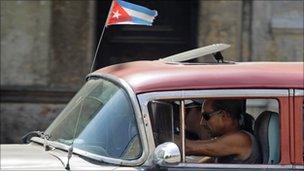Cuba details taxes for the self-employed
- Published

Cuba hopes growing its private sector will help speed up economic development
The Cuban government has outlined the taxes that will have to be paid by the country's growing number of self-employed workers.
It is the latest stage of President Raul Castro's reforms to move Cuba away from a solely state-run economy.
Self-employed workers will have to pay 10% income tax, while those who take on staff will pay more.
It comes after the government announced last month that it was laying off half a million state workers.
Cuba's new tax code is detailed in the latest edition of the country's Communist Party newspaper - Granma.
The article includes an explanation that no government can provide services without gaining tax revenues.
In addition to the 10% income tax, workers will pay another 25% into a social security account from which they will in time draw a pension.
The coverage in Granma adds that successful businesses will see their tax burden rise as they take on more staff.
The government is reducing the once all-encompasing role of the state in the hope that it will boost a stagnant economy.
However, people setting up their own firms will be limited to just 178 professions, including car maintenance and rabbit farming.
- Published24 September 2010
- Published14 September 2010
- Published14 September 2010
- Published2 August 2010